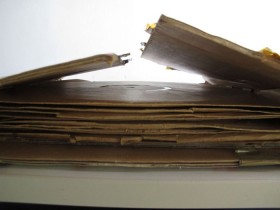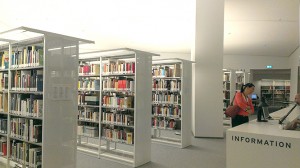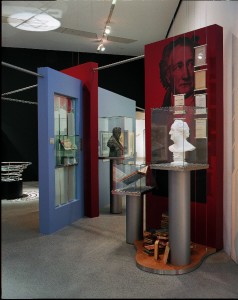There are films slumbering in an archive somewhere, waiting to be discovered. And there are films that have sunk into oblivion but then suddenly pop up again, in the form of a soundtrack.

The schellac records, as found © Jewish Museum Berlin, Photo: Regina Wellen
Recently, when stock was being moved to another depot, our colleague Regina Wellen looked over the collection of 78rpm schellac records with a view to devising a new way of storing them. She thereby came across eleven not yet inventoried records, much larger than the usual sort and with a label suggestive of some other purpose than easy listening on the home gramophone. Luckily for us, Regina was quickly able to establish that these were examples of the sound-on-disc recordings played in cinemas as an accompaniment to screenings of otherwise silent films—synchronously, thanks to the built-in start signal. One of the twenty numbered boxes on each label used to be checked after each screening, so as to ensure that a worn-out record would be replaced in good time. After Regina had dry-cleaned the records and prepared → continue reading
A Visit to the Academy’s Reading Room
Why do we keep books like Muslime im säkularen Rechtsstaat (Muslims in Secular Rule of Law), Diaspora Identities, or z.B. 650 Jahre Rixdorf (E.g. 650 Years of Rixdorf) at the Jewish Museum? Answering this question is the task of the Academy Programs on Migration and Diversity. How to find these books, however, falls to the library.

Reading room of the Jewish Museum Berlin’s library
© Jewish Museum Berlin, photo: Mirjam Bitter
Imagine that you want to learn about social structures, clubs, and immigrant biographies in Berlin, particularly in Kreuzberg, to which you yourself moved from Hesse two years ago. After visiting the museum one fine Sunday afternoon, you take a look at the new Academy, where, you heard, a friend of yours recently attended an event about the ‘new Germans.’ The Academy is closed on the weekend, but a museum host informs you that it has a library. You return on Monday and ask in the reading room about Turks in Kreuzberg. The librarian would love just to tell you, “second shelf on the left, all the way to the back – what you’re looking for is right there.” Unfortunately, it’s not quite that simple. → continue reading
When you do a search of our library catalog for Goethe you could get this idea: 70 hits for works by or about the German poet (by contrast, Schiller only gets 16). And until a few years ago the impressive 1867 Cotta’schen edition of Goethe appeared in our permanent exhibition. Many people used to ask the visitor’s desk: “Was Goethe Jewish?” No, he wasn’t. But for many Jews he was the paragon of German culture, and his works symbolized membership in the German educated middle-class.

Former Goethe installation in the permanent exhibition
© Jewish Museum Berlin, photo: Marion Roßner
A few months ago, the Richard M. Meyer Foundation gave us more than 100 books by and about Richard M. Meyer himself. The son of a banker, art collector, and man of letters was a Goethe scholar. Meyer never acquired a proper professorship, but his 1895 biography of Goethe won awards and was published again and again – as a single volume, in multiple volumes, as a people’s edition and a reserved edition. According to the biography, Goethe saw “nationalities merely as transitional forms” (Volksausgabe [People’s Edition] 1913, p. 352). Statements like this illustrate the dilemma of German-Jewish assimilation during that period. If a Jewish reader of Goethe placed the poet’s cosmopolitanism in the foreground, he exposed himself to the accusation of misunderstanding the German essence of his writings. But when he explicitly recognized just this quality in Goethe’s language, his very right to have a say was contested. → continue reading


